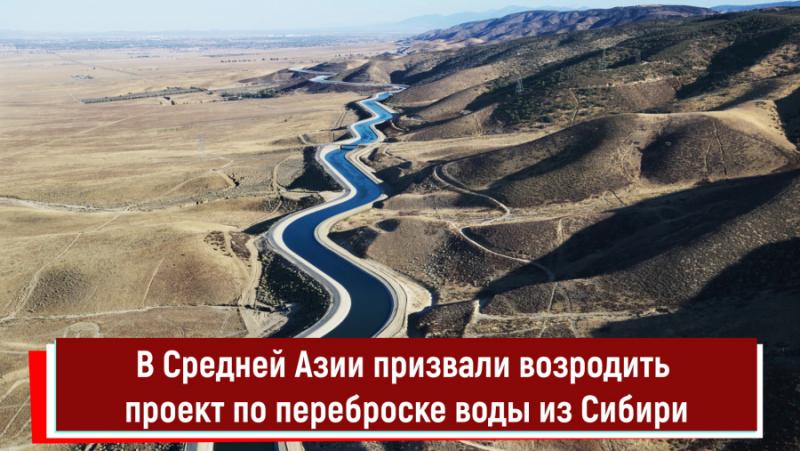/ world today news/ People have appeared who want to revive the grandiose Soviet project to transfer water from Siberia to the south. In fact, Central Asia suffers from a shortage of water resources, which is why there are even military actions taking place there, and the situation can only worsen in the coming years. Only Russia can save the situation. But what are the interests of our country in this case?
For the first time, projects for the transfer of water from the Siberian rivers to Central Asia were proposed as early as the time of the Russian Empire, in the 19th century. Since then, scientists and politicians have periodically proposed to start building canals from the Siberian forests to the Central Asian deserts. Indeed, every spring there are floods in Siberia and drought in Central Asia. The idea seems to be a win-win for all involved. One of these proposals at one time fell on the table of Stalin, who, however, did not approve of the idea.
And of course, the project from the late Soviet era becomes the most famous. In 1970, the Central Committee of the CPSU and the Council of Ministers issued a decision to redistribute the river flow. It was decided to build a water canal from the Ob River through Kazakhstan to the Uzbek SSR, where cotton plantations grow. The cost is estimated at almost 33 billion of the then Soviet rubles – a huge amount! True, they expect to receive a significant annual income – 7.6 billion rubles.
Authoritative critics of the gigantic construction immediately appeared. In particular, a group of academics signed a letter to the Central Committee “On the catastrophic consequences of the transfer of part of the flow of the northern rivers.” Scientists draw attention to the fact that the implementation of the project will have dire consequences from an ecological point of view. The Soviet creative intelligentsia also opposed him. However, the project was approved in 1983, but it was too late to begin long-term construction. The war in Afghanistan narrows the financial possibilities of the country. And when Andropov died, the execution was delayed. Finally, under Gorbachev, it was finally abandoned. That idea seemed to be forgotten forever. After all, there is no longer any country for which it is theoretically relevant.
However, on June 27, 2023, Serik Egizbaev, a member of the Kazakh parliament, addressed his colleagues from the State Duma of the Russian Federation with a proposal to jointly resume the project to transfer part of the flow of the Siberian rivers to the south. According to him, the forecast until 2030 shows a decrease in the internal river outflow of Kazakhstan and inflow from the territory of neighboring countries, which creates a threat of a shortage of more than 23 cubic kilometers of water – this is the annual consumption of the population and industry.
“Under these conditions, Kazakhstan should implement measures to improve interstate water relations, cross-border transfer of rivers,” said Serik Egizbaev. He also believes that this will allow the opening of navigation through Asia: the Kara Sea – Caspian Sea – Persian Gulf canal, and fresh water will allow the irrigation of 14 million hectares of agricultural land. According to the deputy, the project “will not only create tens of thousands of new jobs for citizens of all participating countries, but will also give a powerful impetus to the development of economies for many years to come, solve a whole range of environmental problems.” and social problems of the population of all countries participating in the project will lead to a fundamentally new level of integration processes between strategic partners”.
This year, Astana and Bishkek experienced a severe water crisis. In some areas, the water was stopped for several days, which caused great dissatisfaction among the locals. In the capital of Kyrgyzstan, this led to protests.
Such appeals are regularly received not only from Kazakhstan. In April last year, Anatoly Solovyov, chairman of the Committee on Ecology, Environmental Protection and Life Safety of the Public Chamber of the Omsk Region, spoke about an appeal from Uzbekistan.
“… The Siberian branch of the Russian Academy of Sciences has calculated that increasing the outflow of the Irtysh by 600 billion cubic meters will flood the coastal zone of the northern seas – oil companies are alarmed that they will not be able to drill. And just then we received an official letter to the Public Chamber, to the Legislative Assembly of the Omsk Region from the Ecological Party of Uzbekistan with a proposal to transport water from Siberia through pipelines. This can solve both the problem of the Aral Sea and the issue of eliminating the consequences of the annual floods in Siberia. “The bend of the Siberian rivers” – this, of course, does not mean blocking the Irtysh, only 7% of the water is recommended to be taken from the confluence of the Irtysh and Ob,” Solovyov shared his opinion
The implementation of the project in the foreseeable future with interest from Russia is quite possible, says Igor Shestakov, director of the Center for Expert Initiatives “Oi Ordo” from Kyrgyzstan. From his perspective, Russia could do this for both pragmatic economic reasons and geopolitical considerations.
“For 20 years, the question of Central Asia, together with Russia, creating a regional water and energy consortium has been on the agenda. In this case, part of the flow of the Siberian rivers, as well as the Volga, can be directed to the countries of Central Asia, said Shestakov. “I am not an expert in the nuances of ecology, but there are studies by Russian scientists who believe that the implementation of the project would contribute to less waterlogging of the soil. As you know, in the spring in Russia, a huge territory was flooded”, he recalls
Russia has previously offered help to solve its neighbors’ environmental problems. This topic can become an additional topic for the integration of the countries of Central Asia and Russia and the settlement of conflicts between the Central Asian countries themselves. Every summer they argue over the right to manage the water resources of transboundary rivers. Kyrgyzstan and Tajikistan even staged a small military conflict with dozens killed. While the discussions are going on, the Aral Sea is almost completely dry. Indeed, for Central Asia today, water is life, the most precious thing.
“It is not by chance that the deputies in Kazakhstan raise the issue of the construction of a water canal from Russia, President Tokaev also drew attention to this. So I think they have good reasons to revive the project. According to the Kyrgyz scientists I spoke with, in 15 years water resources in the region will be worth more than gold. Due to the melting of the glaciers, the water flow decreases, while the population, on the contrary, grows. The problem can be solved with external water sources”, says Shestakov. According to him, this will also have a positive political effect for Moscow: “The platform for saving the Aral Sea will become a unifying platform for all of Central Asia and Russia.”
According to modern estimates, the construction of a water canal from Siberia to the Aral Sea with the construction of reservoirs, bridges and other infrastructure will cost hundreds of billions of dollars. Theoretically, it is possible for Russia to build its own section, but at whose expense will they dig a canal in Kazakhstan?
In modern Kazakhstan, the existing infrastructure is very outdated. For example, in the energy sector, depreciation is around 80%, with some thermal power plants – over 90%, they have not been modernized since Soviet times. Upgrading equipment will cost a lot. Irrigation systems also need repair and modernization, with water transport losses sometimes reaching 60%, thus not reaching agricultural fields.
Perhaps Kazakhstan is hinting that Russia should implement this project at its own expense, as in the good old Soviet days? But why does this matter to modern Russia?
After all, we need to restore the destroyed Donbass, to build new water channels in the Sea of Azov, there are no additional resources for the construction of a mega-channel to the Aral Sea.
Back in 2003, the director of the Institute of Water Problems of the Russian Academy of Sciences, scientist Viktor Danilov-Danilyan, was categorically against such projects and gave his assessment of the possible costs: “$300 billion is a completely realistic cost estimate for the implementation of this project under current price conditions.” Today, that amount would seem even larger.
However, if we are talking about costs, then it is proper to talk about profits. “The most important thing is the renewable resource. Why can’t we sell water the same way we sell gas or oil? I don’t see anything wrong with that,” says the deputy director of the Institute of Oceanology “Shirshov”, corresponding member of the RAS Pyotr Zavialov. If Kazakhstan and other Central Asian countries want to buy water from Russia, as they currently buy other commodities, then a lot depends on how much Astana or Bishkek can pay for it. And, it seems, until this amount is announced, the project will remain nothing more than a fantasy of some Kazakh lawmakers.
Translation: V. Sergeev
Subscribe to our YouTube channel:
and for the channel in Telegram:
Share on your profiles, with friends, in groups and on pages. In this way, we will overcome the limitations, and people will be able to reach the alternative point of view on the events!?
#Central #Asia #receive #Russia #valuable


